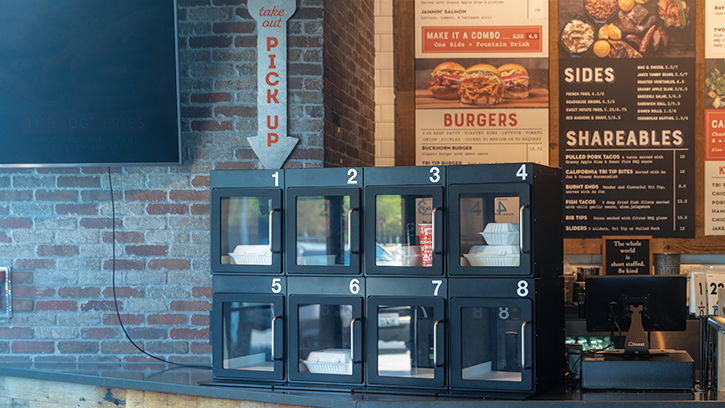Incubating Innovation
Startups & Innovators | INNOVATIONS
Julia Collins already was a serial entrepreneur when she applied to become one of the companies in Mondelēz International’s CoLab incubator last year. The founder of Moonshot Snacks—which produces “climate friendly” crackers via the latest in environmentally sustainable practices—was making her first foray into consumer packaged goods and says she was “interested in learning core disciplines in marketing, operations, sales, and tips and tricks around packaging innovation.”
Mission accomplished. “The [CoLab] program over delivered in important areas,” says Collins, who had launched Moonshot only in 2020 and quickly got the cracker line into more than 1,900 Target stores. “There was a network of other CPG founders, so now I have close relationships with peers. Second, I have access to data that’s often difficult to get and people in Mondelēz who can help us understand how to leverage that data to make decisions and tell stories.
“And third is the marketing and brand piece,” she continues. “We went in with a strong visual identity and brand for Moonshot but worked with [CoLab] on messaging and storytelling, and we came up with taglines like, ‘the world’s most helpful cracker,’ which you’ll see across a lot of our marketing.”
Over the past decade or so, dozens of companies in the CPG industry as well as in agriculture, ingredients, and food retailing have launched incubators and accelerators to gain access to innovations and to entrepreneurial ways of thinking that they weren’t obtaining to their satisfaction from their own laboratories and overall R&D operations.
As hundreds of startups the world over have been revolutionizing the food and beverage business from the ground up, tapping into these external idea factories has helped big CPG players participate in the major shifts toward healthful eating, plant-based ingredients, and digital marketing and distribution, rather than being left behind.
The Value Proposition
Large food and beverage companies have gotten pickier about investing in and acquiring smaller innovators, experts in the field say, but their appetite for incubator and accelerator programs—which expose them to manifold innovations at little expense—seems to be growing unabated.
“The big companies are getting knowledge,” says Ken Harris, managing partner of the Cadent Consulting Group. “And they’re either going to acquire some of these small companies or get information to help their other businesses.”
Lately, more big companies also have been leveraging what they’ve learned from their incubator programs to goose “intrapreneurship” with similar initiatives as pressures from shareholders and rising costs have prompted them to overhaul their own architectures for innovation.
For startup enrollees, the incubator and accelerator programs are “taking a powerful idea or a unique concept that is differentiated and special and helping them bring it out to the world larger and more quickly,” says Jonathan Tofel, founder and CEO of the Mission Field consultancy. “In the best models, the big companies advise, counsel, and direct them without being heavy-handed, giving the little guys the connections, guidance, and background knowledge they need for the next step but not trying to take them over.”
There’s no scorecard for success or failure of incubators and accelerators, but clearly some major companies have stubbed their toes. Kraft Heinz, for example, shut down its Springboard incubator in 2021, under new CEO Miguel Patricio, just a few years after launching it.
“There has to be senior-level buy-in because often those executives’ time is more valuable than the money it costs the company to run the [incubator] program,” says Brett Brohl, managing partner of the Bread and Butter food venture firm. “And if the people below don’t see their senior leaders be mentors, they’re not going to do it either.”
Here’s a look at developments within three CPG incubator and accelerator programs.
Mondelēz. The snack giant this year expanded its CoLab accelerator program to include a CoLab Tech cohort aimed specifically at linking with startups addressing key challenges and opportunities in food technology and sustainability, such as regenerative agriculture, improved sensory experiences for ingredients, and even modern options for heating and cooling factories.
“We’re tapping a whole range of capabilities in that food-tech environment that we may not have internally,” says Ian Noble, a Mondelēz vice president of R&D. “From an innovation point of view, if you want to transform the place, you don’t start from where you are. This is a really great extension of the CoLab program.”
Noble expects CoLab Tech to build on the existing track record of Mondelēz’s accelerator, giving the company more swings of the bat at innovations. “The classic ratio of having 10,000 ideas that result in one new product on the market doesn’t really change,” he says. “So getting access to more great and diverse thinking enables us to improve that ratio.”
Plus, Mondelēz gets exposed to raw entrepreneurial culture. “Every large CPG has a purposefully designed and built innovation process, but to some extent that takes away some of the passion and drive,” Noble says. “So, what startups can bring to the conversation is almost just themselves, so we can have real, engaged dialogue with the companies that are coming forward.”
Nestlé. The Swiss giant got a relatively late start on the accelerator game in 2019 but since has been expanding its R&D accelerator network globally to encompass both external startups and intrapreneurial ventures. Now, there are 14 locations around the world, some focused on geographies and others focused on specific categories, such as dairy.
“We’re proud of how far we’ve come in such a short amount of time,” says Joanna Yarbrough, head of Nestlé’s U.S. R+D Accelerator. “We’re seeing the opportunity to bring R&D closer to business, bring new technologies more quickly to market and test and experiment with new ideas.”
For example, Nestlé’s accelerator has worked with Sundial Foods, a startup that is producing vegan “chicken wings” out of ingredients including chickpeas and sunflower oil, as well as Perfect Day, a maker of animal-free dairy protein alternatives. And an internal accelerator team developed a frozen meal line for diabetics that Nestlé soon will launch under its Lean Cuisine brand.
Cargill. The ingredient titan sports a range of ways to tap into external innovation that includes a ventures fund that focuses on external startups. But in a twist, it has applied an incubator approach to internal innovation, which it calls Digital Business Studio.
“It’s our way of looking at our own employees to incubate various ideas that we can implement as well as look at various problems in the food and ag industry that we’re best suited to go after,” says Michael Glowacki, Cargill’s vice president of digital.
Cargill encourages its researchers to come up with ideas that have large market potential and “are aligned with where Cargill wants to head in the near future,” he explains. The company dedicates seed funding of less than $100,000 for developing the idea, which is metered carefully from then on but can grow to up to $1 million if the intrapreneur’s notion is strong enough to reach higher-level evaluation of its customer targets and business model.
One enterprise that made it through the Digital Business Studio funnel is Chekt, a food locker system that allows customers attending sporting events to order concessions at the game via an app and then leave their seats at their convenience to pick up the food at a common area locker. It’s also in use in a restaurant chain for fulfillment of takeout orders.
“Our customers are expecting more from digital and data and wanting us to be part of that,” Glowacki says. “Cargill is uniquely positioned to help meet some of those strategy initiatives.”




